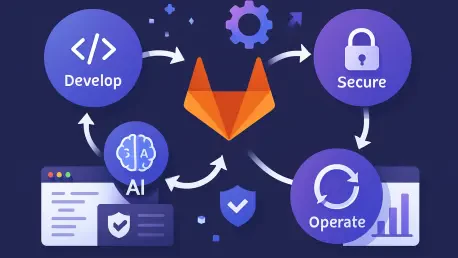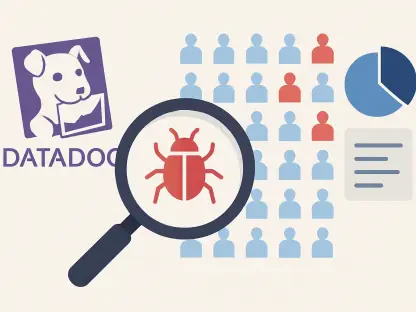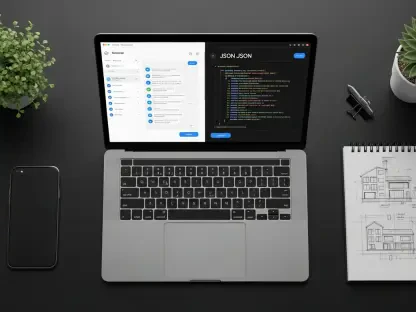In an era where software development is increasingly complex and security threats loom larger than ever, GitLab stands as a beacon of innovation with its AI-native DevSecOps platform, seamlessly blending code creation, testing, and security into a unified workflow. This integrated approach has positioned the company as a leader in a rapidly evolving industry, catering to enterprises desperate for streamlined, secure, and automated solutions. As development pipelines grow more intricate, the demand for tools that embed compliance and security directly into the process has surged, and GitLab appears to be meeting this need head-on with features like GitLab Duo for AI-driven code review and vulnerability detection. Yet, with fierce competition from industry giants and innovative challengers alike, the question remains whether this momentum can be maintained in a crowded market where differentiation is key to survival.
GitLab’s Strategic Advantages in DevSecOps
Harnessing AI for Workflow Automation
GitLab’s platform has redefined the DevSecOps landscape by leveraging artificial intelligence to automate critical tasks across the development lifecycle. With tools like GitLab Duo, the company enables developers to conduct code reviews and detect vulnerabilities with unprecedented efficiency, reducing the reliance on disparate tools that often complicate workflows. This AI-driven approach not only accelerates development but also embeds security as a core component, addressing a pressing need for enterprises grappling with escalating cyber threats. The evolution toward the Duo Agent Platform further amplifies this capability, allowing autonomous task execution across pipelines. Such advancements position GitLab as a central control layer for development, security, and automation, offering a compelling value proposition to organizations seeking to unify their processes in an increasingly fragmented digital environment.
Driving Enterprise Adoption Through Innovation
Beyond technological innovation, GitLab’s growth is evidenced by its robust financial metrics and expanding customer base, reflecting strong market acceptance. Analysts project fiscal third-quarter revenues to reach $238.61 million, marking a significant 21.7% increase year-over-year, while the number of customers generating over $100,000 in annual recurring revenue is expected to hit 1,372, up 20% from last year. Additionally, a dollar-based net retention rate of 120% underscores the platform’s stickiness among high-value accounts. These figures highlight how GitLab’s consolidated, secure, and AI-integrated solutions resonate with enterprises navigating the complexities of modern software development. The trend toward unified platforms that can manage secure and automated pipelines continues to drive demand, positioning GitLab favorably among organizations prioritizing efficiency and compliance in their operations.
Challenges and Competition in the Market
Navigating Threats from Industry Giants
Despite its impressive strides, GitLab faces formidable competition from major players like Microsoft, whose integration of GitHub and Azure DevOps presents a seamless adoption pathway for enterprises already embedded in the Azure ecosystem. Enhanced by features like GitHub Advanced Security, Microsoft’s offerings pose a direct challenge to GitLab’s market share by leveraging an expansive cloud infrastructure that appeals to large organizations. This competitive pressure is compounded by the broader industry trend of integrating security and development tools into cohesive ecosystems, a space where Microsoft holds significant sway. For GitLab, maintaining a distinct edge requires not just innovation but also strategic partnerships and integrations that can match the scale and reach of such rivals, ensuring it remains a preferred choice for diverse enterprise needs.
Countering Diverse Approaches from Rivals
Adding to the competitive landscape, Atlassian emerges as another significant contender with its suite of tools like Jira, Bitbucket, and Bamboo, complemented by the Open DevOps initiative that boosts security visibility through third-party integrations with solutions like Snyk and Mend. This approach contrasts with GitLab’s unified platform by emphasizing flexibility and interoperability, appealing to organizations that prioritize customizable workflows over an all-in-one solution. As the DevSecOps market diversifies with varied strategies, GitLab must continuously evolve its offerings to address niche demands while reinforcing its core strengths in automation and security. The ability to adapt to these competing visions will be critical, as enterprises increasingly seek tailored solutions that align with their unique operational frameworks in a dynamic and ever-shifting technological arena.
Looking Ahead: Sustaining Momentum
Reflecting on Past Achievements and Challenges
Looking back, GitLab carved a notable path in the DevSecOps realm by delivering a platform that adeptly combined AI-driven automation with robust security features, earning substantial trust from enterprises worldwide. Financial growth mirrored this success, with significant revenue increases and a growing base of high-value clients signaling market confidence in its vision. Yet, the journey was not without hurdles, as intense rivalry from established players like Microsoft and Atlassian tested GitLab’s resilience. Their expansive ecosystems and alternative approaches to integration challenged GitLab to sharpen its focus on differentiation, ensuring that its innovations stood out in a crowded field. This period highlighted the delicate balance between maintaining a unique identity and responding to broader industry shifts that shaped enterprise expectations.
Charting Future Pathways for Growth
As the DevSecOps landscape continues to evolve, GitLab’s next steps should center on deepening its AI capabilities and expanding cloud-agnostic integrations to cater to diverse enterprise environments. Strengthening partnerships with leading AI providers and enhancing platform scalability could fortify its position against competitors. Additionally, investing in tailored solutions that address specific industry verticals might offer a competitive edge, ensuring relevance across varied sectors. Staying ahead will also require a keen focus on customer feedback to refine features and maintain the high retention rates that have been a hallmark of its success. By prioritizing adaptability and continuous innovation, GitLab can navigate the challenges of a dynamic market, building on its established foundation to drive sustained growth and influence in the years ahead.









